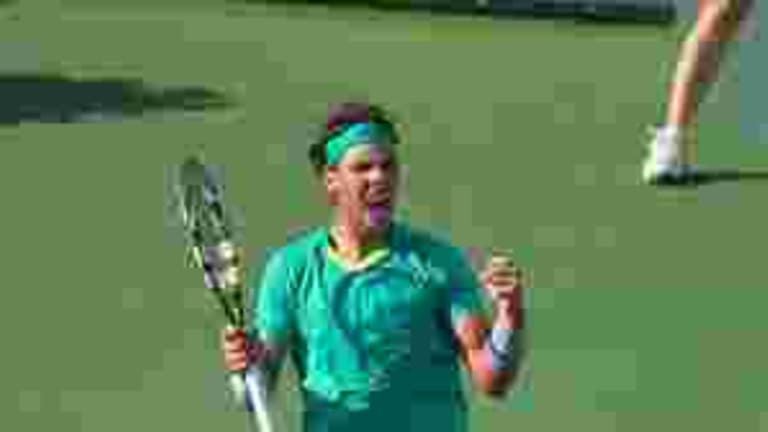Whatever else has been gained or lost during Rafael Nadal’s long absence from the game, it’s clear that neither his ability to think his way through matches nor his fighting spirit have been in any way impaired. After falling behind a set and a break to Juan Martin del Potro, Nadal roared back to win, 4-6, 6-3, 6-4, claiming the Indian Wells title, his record twenty-second Masters crown and his first hard-court title since 2010.
Nadal took the long route to the victory, after taking advantage of a typically sleepy start from del Potro by breaking immediately. Del Potro was in serious danger of going down a double-break at 0-3 before his forehand turned up in the nick of time. He quickly moved up the gears, breaking back after Nadal double-faulted on game point at 3-1.
Nadal has struggled to find consistent accuracy on his forehand throughout the week, and as del Potro started to serve better and put together those belief-beggaring sequences of forehands with which he had overwhelmed Novak Djokovic and Andy Murray, Rafa looked rocked, uncertain, and devoid of rhythm. Del Potro won six of the final seven games in the first set to jump ahead.
Broken immediately at the start of the second set, Nadal let loose with a brief snarl of frustration after del Potro erased a possible break-back point with another huge cross-court forehand. Being Nadal, however, he rebounded quickly, going back to his bread-and-butter, brutally effective play of opening up the court with a wide serve and ripping his forehand into space. It bought him two service holds and a palpable return of intensity after some tentative play.
Del Potro, meanwhile, having soared through a set-and-a-half, was poised to come down to earth eventually—he must have been desperate to close it out in straights after two grueling three-setters in the past two days. That manifested itself in an excruciatingly poor drop-shot to open the 3-1 game; he got away with it, but immediately followed with a double-fault and a forehand error before Nadal converted his second break point.
It was all the invitation Nadal needed. As del Potro started to back off on his backhand, Nadal played with ever more aggression, especially to that side, manufacturing opportunities point after point to step inside the court and attack. With that upswing in aggression, Nadal’s accuracy seemed to return as well, as he broke for a third time and served out the second set to love.
After it took del Potro 10 minutes and 21 seconds to hold serve to open the third set—before Nadal held in under ninety seconds—the writing was on the wall for the Argentine, and he was broken in the next game. He went down swinging, but Nadal’s shot selection was nearly impeccable by this point, and although del Potro fought off three match points at 3-5, it was both metaphorically and physically last-gasp stuff.
Nadal finished the match in superb style, looking as confident and fearsome at the end as he had uncertain in the beginning. Having withdrawn from Miami, he can focus clearly on the upcoming European clay tournaments. I’d warn the rest of the ATP to be healthily afraid, but if they’ve been paying attention, they are already.
